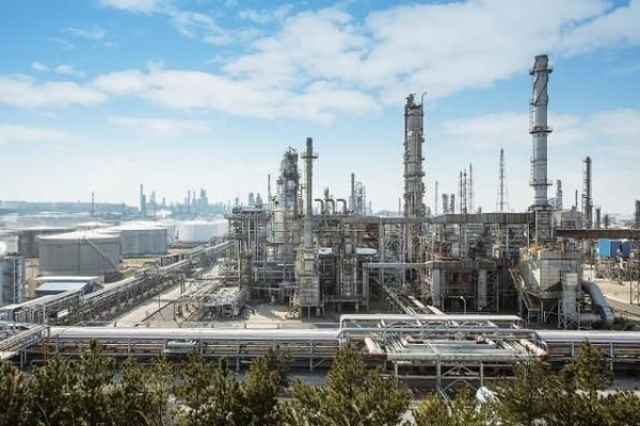Energy
HD Hyundai Oilbank to build eco-friendly power plants
The company will boost its white biotechnology unit by starting commercialization by 2025 with LNG and blue hydrogen as fuel
By Jun 01, 2023 (Gmt+09:00)
1
Min read
Most Read
LG Chem to sell water filter business to Glenwood PE for $692 million


Kyobo Life poised to buy Japan’s SBI Group-owned savings bank


KT&G eyes overseas M&A after rejecting activist fund's offer


StockX in merger talks with Naver’s online reseller Kream


Mirae Asset to be named Korea Post’s core real estate fund operator



South Korea's HD Hyundai Oilbank is pursuing the construction of eco-friendly power plants powered by liquefied natural gas and blue hydrogen.
The company's power generation subsidiary HD Hyundai E&F will build power generation facilities with steam capacity of 230 tons per hour and 290 megawatts of electricity, with commercial operation to start in 2025. The output of steam and electricity will go to HD Hyundai Oilbank affiliates like HD Hyundai Chemical and HD Hyundai and Shell Base Oil at the company's Daesan plant in Seosan, South Chungcheong Province.
White biotechnology is one of HD Hyundai Oilbank's future businesses. The conventional bio sector extracts energy from edible resources such as soybeans, corn and palm but developing economies are leading efforts toward stricter regulation of the use of edible raw materials given the growing severity of side effects such as deforestation.
HD Hyundai Oilbank will use non-edible resources such as oil residue, waste cooking oil and fallen palm fruit as raw materials.
The company's white biotechnology roadmap has as its first step a cutting-edge biodiesel plant with annual capacity of 130,000 tons to be built this year on a site of 10,000 square meters at the Daesan plant.
Several facilities at the plant by next year will be converted into factories for hydrogenated vegetable oil (HVO) with annual capacity of 500,000 tons. An eco-friendly energy source produced by adding hydrogen to non-edible raw materials, HVO is mainly used in Europe as eco-friendly fuel.
The second stage is output of next-generation bio jet fuel using HVO for the company to pioneer the global market.
Write to Mi-Sun Kang at misunny@hankyung.com
More to Read
-
 EnergyHD Hyundai Energy Solutions to develop ultra-high efficiency solar panel
EnergyHD Hyundai Energy Solutions to develop ultra-high efficiency solar panelMay 12, 2023 (Gmt+09:00)
1 Min read -
 Shipping & ShipbuildingHD Hyundai develops S.Korea's first offshore supply base for ammonia
Shipping & ShipbuildingHD Hyundai develops S.Korea's first offshore supply base for ammoniaApr 19, 2023 (Gmt+09:00)
1 Min read -
 Carbon neutralityHD Hyundai forms S.Korea's first integrated carbon footprint team in shipbuilding
Carbon neutralityHD Hyundai forms S.Korea's first integrated carbon footprint team in shipbuildingMar 17, 2023 (Gmt+09:00)
1 Min read -
 ESG3 HD Hyundai affiliates to help ESG management of biz partners
ESG3 HD Hyundai affiliates to help ESG management of biz partnersJan 12, 2023 (Gmt+09:00)
1 Min read -
 Korean Innovators at CES 2023HD Hyundai to boost offshore wind power, future ships, CEO says
Korean Innovators at CES 2023HD Hyundai to boost offshore wind power, future ships, CEO saysJan 05, 2023 (Gmt+09:00)
2 Min read
Comment 0
LOG IN


